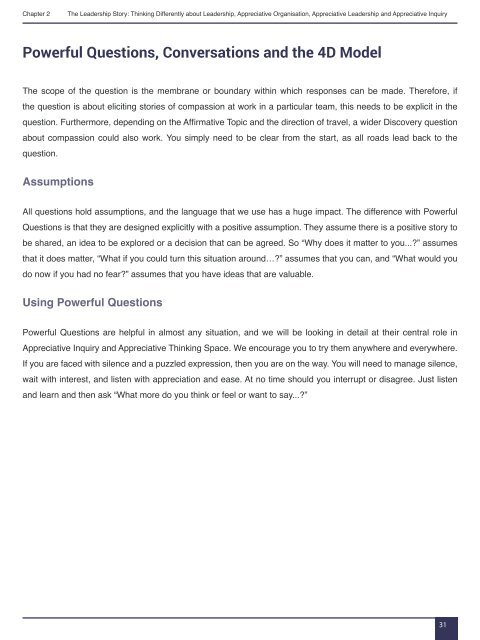Appreciative-Leadership
Appreciative-Leadership
Appreciative-Leadership
You also want an ePaper? Increase the reach of your titles
YUMPU automatically turns print PDFs into web optimized ePapers that Google loves.
Chapter 2<br />
The <strong>Leadership</strong> Story: Thinking Differently about <strong>Leadership</strong>, <strong>Appreciative</strong> Organisation, <strong>Appreciative</strong> <strong>Leadership</strong> and <strong>Appreciative</strong> Inquiry<br />
Powerful Questions, Conversations and the 4D Model<br />
The scope of the question is the membrane or boundary within which responses can be made. Therefore, if<br />
the question is about eliciting stories of compassion at work in a particular team, this needs to be explicit in the<br />
question. Furthermore, depending on the Affirmative Topic and the direction of travel, a wider Discovery question<br />
about compassion could also work. You simply need to be clear from the start, as all roads lead back to the<br />
question.<br />
Assumptions<br />
All questions hold assumptions, and the language that we use has a huge impact. The difference with Powerful<br />
Questions is that they are designed explicitly with a positive assumption. They assume there is a positive story to<br />
be shared, an idea to be explored or a decision that can be agreed. So “Why does it matter to you...” assumes<br />
that it does matter, “What if you could turn this situation around…” assumes that you can, and “What would you<br />
do now if you had no fear” assumes that you have ideas that are valuable.<br />
Using Powerful Questions<br />
Powerful Questions are helpful in almost any situation, and we will be looking in detail at their central role in<br />
<strong>Appreciative</strong> Inquiry and <strong>Appreciative</strong> Thinking Space. We encourage you to try them anywhere and everywhere.<br />
If you are faced with silence and a puzzled expression, then you are on the way. You will need to manage silence,<br />
wait with interest, and listen with appreciation and ease. At no time should you interrupt or disagree. Just listen<br />
and learn and then ask “What more do you think or feel or want to say...”<br />
31


